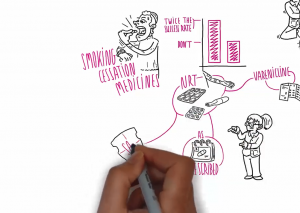
How does smoking cause stress?
Most of us feel anxious, irritable or worried sometimes. But if you smoke, it could be a trigger to make you reach for a cigarette.
The fact is that smoking can make your stress worse. The nicotine in a cigarette increases your heart rate and your blood pressure. Your heart works harder and pumps faster as it pushes the nicotine up to your brain quickly, actually increasing stress in your body.
Dopamine levels
Dopamine is a chemical in the brain that is released when you feel good. When you feel pleasure or motivation, that’s dopamine.
Ever feel like you finish one cigarette and soon you’re craving another? The stress you feel is caused by the dopamine response you had to the cigarette you just finished.
When the feel-good factor caused by dopamine fades, your nicotine cravings get to work. The result is that you quickly feel worse than before you had the cigarette.
These feelings are relieved for a short time when you smoke a cigarette. But this relief doesn’t last long, your body soon starts to crave another cigarette, making you feel irritable and anxious again – you might even feel your heart rate and stress levels rising. Over time, people who smoke are more likely to develop anxiety and depression than people who do not smoke.

Mental health benefits of quitting
People report that they feel much calmer, more positive, and have a better quality of life after stopping smoking. The effect has been proven to be similar to taking antidepressants for people with a diagnosed mental health issue.
When people stop smoking, studies show:
- anxiety, depression and stress levels are lower
- quality of life and positive mood improve
- the dosage of some medicines used to treat mental health problems can be reduced

How can I make quitting less stressful?
The important thing here is to manage your cravings in a way that is less harmful than smoking tobacco. You can use stop smoking aids, such as nicotine replacement therapy (NRT), or vapes to give you the same nicotine without the harmful part of the cigarette.
If you want to stop smoking, contact your local stop smoking service, which will provide support to quit.
A trained stop smoking advisor can talk about the different stop smoking aids and help you decide which will work best for you. They can work out how best to manage your cravings before they pass.
If you take medicines or antidepressants, you must talk to your GP or psychiatrist to get advice on the amount you need to take.
It’s a myth that smoking helps with stress. Quitting can reduce your stress and anxiety.
Consultant psychiatrist Dr Eilish Gilvarry explains….

Do you ever think you couldn’t cope without cigarettes and smoking helps you cope?
In fact quitting could give your mood a real boost. Watch the video below to find out how…


Smoking and dementia
None of us like to think about developing dementia. But evidence is clear that smoking raises the risks of developing dementia.
- Smoking increases the risk of vascular problems which affect blood vessels and can lead to strokes or smaller bleeds in the brain. These increase the risk of dementia.
- Poisonous chemicals in cigarette smoke cause inflammation and stress and kill off brain cells and neurons, which increase the risk of Alzheimer’s Disease.
Alzheimer’s Research UK advise: “evidence is that stopping smoking reduces your risk of dementia. This is similar to other findings with smoking, where stopping smoking leads to a reduction in the risk of cardiovascular disease or cancer.”
